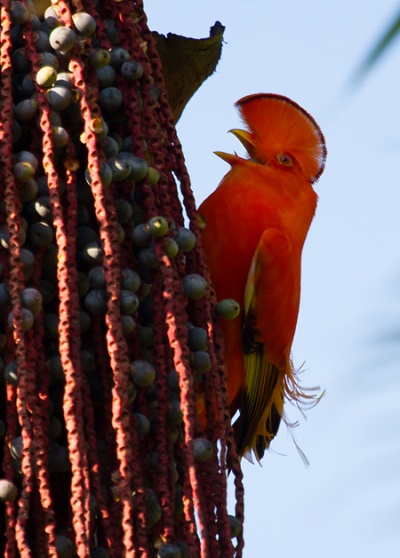(typo) |
(Some extra information. Picture sizes and placement. References) |
||
| Line 1: | Line 1: | ||
| + | [[Image:Galo da serra1.jpg|thumb|400px|right|Photo by {{user|Ronaldo+Garcia|Ronaldo Garcia}} <br />Amazônia, [[Brazil]], August 2014]] | ||
;[[: Category:Rupicola|Rupicola]] rupicola | ;[[: Category:Rupicola|Rupicola]] rupicola | ||
| − | |||
| − | |||
==Identification== | ==Identification== | ||
| + | 27–32 cm (10½-12½)<br /> | ||
| + | '''Male''' | ||
| + | *Bright orange overall plumage | ||
| + | *Semi-circular disc-shaped crest from forehead to nape<br /> | ||
| + | '''Female''' | ||
| + | *Olive-grey plumage | ||
| + | *Crest is smaller | ||
| + | ====Similar Species==== | ||
In the male, the crest is bordered with a dark stripe while the wing is much less dark than in [[Andean Cock-of-the-Rock]]. Female is much darker than female Andean Cock-of-the-Rock. | In the male, the crest is bordered with a dark stripe while the wing is much less dark than in [[Andean Cock-of-the-Rock]]. Female is much darker than female Andean Cock-of-the-Rock. | ||
==Distribution== | ==Distribution== | ||
| − | [[Colombia]] | + | [[South America]]: found from eastern[[Colombia]] to southern [[Venezuela]], The [[Guianas]], and northern Amazonian [[Brazil]]. |
| + | [[Image:Guianan_Cock-of-the-rock.jpg|thumb|300px|right|Photo by {{user|juninho|juninho}} <br />Kaieteur Falls, [[Guyana]], March 2005]] | ||
==Taxonomy== | ==Taxonomy== | ||
| − | This is a monotypic species. | + | This is a [[Dictionary_M-S#M|monotypic]] species<sup>[[#References|[1]]]</sup>. |
==Habitat== | ==Habitat== | ||
| − | Humid forest, with rocky walls necessary for nesting. | + | Humid forest, with rocky walls necessary for nesting. Mostly found up to 1200 m, occasionally occuring to 2000 m. |
==Behaviour== | ==Behaviour== | ||
| + | ====Diet==== | ||
| + | Their main diet consists of fruit, with the addition of insects, small reptiles and frogs. | ||
| + | ====Breeding==== | ||
Males display in leks. | Males display in leks. | ||
| + | ==References== | ||
| + | #{{Ref-Clements6thAug15}}#Handbook of the Birds of the World Alive (retrieved February 2016) | ||
| + | #Neotropical Birds. Cornell. | ||
| + | {{ref}} | ||
==External Links== | ==External Links== | ||
{{GSearch|Rupicola+Guianan}} <!--- Comment: straight scientific name does not give a specific search ---> | {{GSearch|Rupicola+Guianan}} <!--- Comment: straight scientific name does not give a specific search ---> | ||
[[Category:Birds]] [[Category:Rupicola]] | [[Category:Birds]] [[Category:Rupicola]] | ||
Revision as of 00:15, 14 February 2016
- Rupicola rupicola
Identification
27–32 cm (10½-12½)
Male
- Bright orange overall plumage
- Semi-circular disc-shaped crest from forehead to nape
Female
- Olive-grey plumage
- Crest is smaller
Similar Species
In the male, the crest is bordered with a dark stripe while the wing is much less dark than in Andean Cock-of-the-Rock. Female is much darker than female Andean Cock-of-the-Rock.
Distribution
South America: found from easternColombia to southern Venezuela, The Guianas, and northern Amazonian Brazil.
Taxonomy
This is a monotypic species[1].
Habitat
Humid forest, with rocky walls necessary for nesting. Mostly found up to 1200 m, occasionally occuring to 2000 m.
Behaviour
Diet
Their main diet consists of fruit, with the addition of insects, small reptiles and frogs.
Breeding
Males display in leks.
References
- Clements, J. F., T. S. Schulenberg, M. J. Iliff, D. Roberson, T. A. Fredericks, B. L. Sullivan, and C. L. Wood. 2015. The eBird/Clements checklist of birds of the world: v2015, with updates to August 2015. Downloaded from http://www.birds.cornell.edu/clementschecklist/download/
- Handbook of the Birds of the World Alive (retrieved February 2016)
- Neotropical Birds. Cornell.
Recommended Citation
- BirdForum Opus contributors. (2024) Guianan Cock-of-the-rock. In: BirdForum, the forum for wild birds and birding. Retrieved 27 April 2024 from https://www.birdforum.net/opus/Guianan_Cock-of-the-rock





